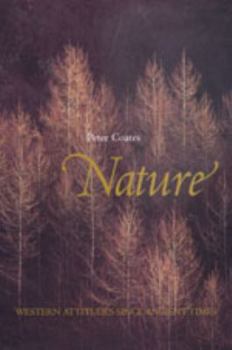Nature
Select Format
Select Condition 
Book Overview
In an advertisement for water filter cartridges, we see a tumbling waterfall. The caption reads, "Like nature, Brita is beautifully simple." What kind of thinking is this? Is nature an objective... This description may be from another edition of this product.
Format:Hardcover
Language:English
ISBN:0520217438
ISBN13:9780520217430
Release Date:November 1998
Publisher:University of California Press
Length:256 Pages
Weight:0.15 lbs.
Dimensions:1.0" x 6.2" x 9.3"
Related Subjects
Biological Sciences Business & Investing Earth Sciences Ecology Education & Reference Environment Environmental Science Environmentalism Historical Study & Educational Resources Historiography History & Philosophy Nature Nature & Ecology Popular Economics Reference Science Science & Math Science & Scientists Science & TechnologyCustomer Reviews
1 rating
Readable Synthesis, Fascinating Introduction
Published by Thriftbooks.com User , 18 years ago
In Nature: Western Attitudes Since Ancient Times, historian Peter Coates aims to highlight the vast diversity of meanings that various Western cultures have ascribed to their relationships with nature. His book is a synthesis of existing work on historical attitudes and ideas, written for those with little previous knowledge of the subject. The underlying message is one of the fundamental presumptions of the study of thought and culture within the field of environmental history: the way people view nature changes over time. Nature is, in part, an overview of the intellectual history of the Western world since the Greeks. Coates admits to a relatively limited definition of the West, using mostly British and American sources with brief forays into other regions of Europe. The first half of the book is organized by period, starting with ancient Greece and Rome and going on thorough early modernity. The second half, while still chronological, is organized thematically, exploring questions such as gauging the impact of European thought and action on other regions and the intellectual roots of modern-day conceptions of nature. Coates synthesizes a wide variety of secondary sources, utilizing both modern day historical and ecological studies as well as work from earlier disciplines that explored similar questions. At the same time, the book is an argument in defense of the complexity of human-nature relationships. Coates subtly but frequently argues against interpreting the past as a series of great watershed moments bracketed by centuries of stasis. Rather, he advocates for understanding history as a dynamic process. The ways that people understand and define nature shift constantly, with existing practices inspiring new ideas and dialectically creating new practices. This is mirrored in Coates' historiography, which often highlights inconsistencies and disagreements among existing historical interpretations. Coates' synthesis is both readable and nuanced. It is an excellent introduction to the thought and culture wing of environmental history, although it is unclear how representative the book is of anything broader than the United States and Great Britain. While I'm not sure the book truly lives up to the promises of its title, it was clearly necessary to limit the scope of the project in some way. Coates is very cautious about conflating similarities with influences, which occasionally leaves the reader wondering about how ideas are connected at all and making the book less like history and more like a textbook. But more often it helps emphasize how hard we must work to not take out cultural assumptions for granted when looking at the histories of others. Because Coates seeks to elucidate questions rather than answer them, the book grazes over a number of topics and ideas that whet the historical appetite beginning student of environmental history. Coates articulates with clarity the "big questions" of environmental history wh






